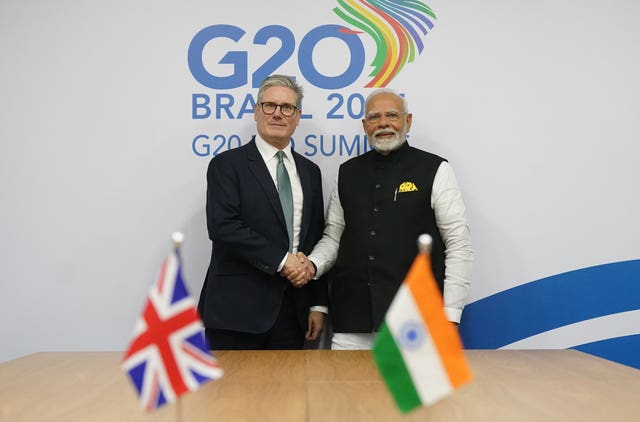UK and India agree trade deal, slashing tariffs on car and whisky exports
The deal follows three years of talks and is set to boost several sectors which are hit especially hard by Donald Trump’s tariffs.

The UK and India have sealed a free trade agreement, in a deal which is hoped will boost sectors hardest hit by Donald Trump’s tariffs.
The deal, announced on Tuesday afternoon, will mean dramatic tariff reductions on scotch whisky and car exports to India, while levies on aerospace, electricals and other food products will also fall.
UK consumers are also expected to benefit from tariffs being reduced on some Indian goods such as clothing imported to the country.
Prime Minister Sir Keir Starmer said: “We are now in a new era for trade and the economy. That means going further and faster to strengthen the UK’s economy, putting more money in working people’s pockets.”
He added: “Today we have agreed a landmark deal with India – one of the fastest growing economies in the world, which will grow the economy and deliver for British people and business.”
Indian prime minister Narendra Modi described it as a “historic milestone” and an “ambitious and mutually beneficial” trade agreement that will “catalyse trade, investment, growth, job creation, and innovation in both our economies”.
“I look forward to welcoming PM Starmer to India soon,” he added.
More than a dozen rounds of talks involving successive governments have taken place since 2022 with the aim of securing a trade pact with India, which is forecast to become the world’s third largest economy.
Key sticking points had included high tariffs on Scotch whisky in India and visa rules for Indian students and professionals.
Business and Trade Secretary Jonathan Reynolds and Indian commerce minister Piyush Goyal held final talks in London last week after relaunching negotiations two months ago.
The deal means the UK will do significantly more business with the fast-growing economy of 1.4 billion people.
It is estimated to add £4.8 billion to gross domestic product, £2.2 billion to wages and £25.5 billion to bilateral trade each year from 2040, the Government said.
Mr Reynolds said: “By striking a new trade deal with the fastest-growing economy in the world, we are delivering billions for the UK economy and wages every year and unlocking growth in every corner of the country, from advanced manufacturing in the North East to whisky distilleries in Scotland.
“In times of global uncertainty, a pragmatic approach to global trade that provides businesses and consumers with stability is more important than ever.”
The Government said the deal means tariff reductions on 90% of exports that currently have levies, while 85% will be fully tariff-free within a decade.

Whisky and gin tariffs will be halved from 150% to 75% before reducing to 40% by the 10th year of the deal, while automotive tariffs will fall from over 100% to 10%.
It provides a boost to the two sectors which look set to be hit especially hard by Donald Trump’s tariffs, which sent shockwaves through the global trading system last month.
India has also agreed to reduce tariffs on medical devices, advanced machinery, and lamb.
Based on 2022 trade, this amounts to India cutting tariffs worth over £400 million when the deal comes into force, which will more than double to around £900 million after 10 years.
On the other side, as part of the negotiations the UK has agreed to reduce or eliminate tariffs on Indian imports, including textiles, apparel, and footwear, and some food products like frozen prawns.
This is expected to increase competition between suppliers and result in lower prices in shops for British consumers.
It could take up to a year for the deal to come into force.
Mark Kent, chief executive of the Scotch Whisky Association, called it a “landmark moment” which will be “transformational for the industry”.
He said it has the potential to increase Scotch Whisky exports to India by £1bn over the next five years.
The deal also includes a double contributions convention (DCC) – which will mean Indian workers coming to Britain, and British workers going to India, will not have to pay national insurance contributions in both countries for the first three years.
Furthermore, a new cap on the number of Indian professionals who can come to the UK – musicians, chefs, and yogis – was agreed as part of the negotiations.
The changes are expected to make it more straightforward for such professionals to apply for a visa.
Rain Newton-Smith, chief executive of the Confederation of British Industry (CBI), said the UK’s trade deal with India was a “beacon of hope amidst the spectre of protectionism”.
“In its mission for growth, it is right that the Government seeks to strengthen and expand the UK’s trading relationships with partners around the world,” she said.





